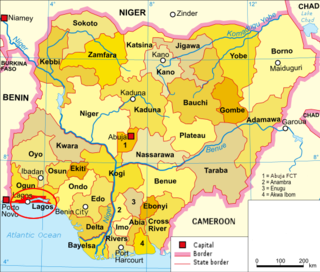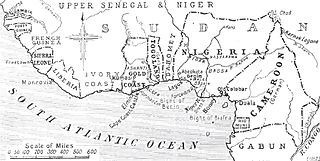See also
- Egba Alake, one of the five sections of Egbaland
| This disambiguation page lists articles associated with the title Egba. If an internal link led you here, you may wish to change the link to point directly to the intended article. |
Egba may refer to:
The Egba people are a subgroup of the Yoruba people, an ethnic group of western Nigeria, majorly from the central part of Ogun State that is Ogun central senatorial district.
The Egba United Government (EUG) was a political entity in the late 19th century in what is today Nigeria. The Government was formally established by the Lagos Colony Governor - Mccallum at a meeting organised in 1898, by William Alfred Allen an Egba man who was the Colonial Government Agent in Abeokuta. William Alfred Allen was appointed the First Secretary to the Government by the Colonial government while the Egba rulers were given government portfolios.
| This disambiguation page lists articles associated with the title Egba. If an internal link led you here, you may wish to change the link to point directly to the intended article. |

The Egbado, now Yewa, are a clan of the Yoruba people, and inhabit the eastern area of Ogun West Senatorial District, Ogun State, in south-west Nigeria, Africa. In 1995 they changed their name to the Yewa. Yewa clan now comprises 4 local Governments Yewa South, Yewa North, Imeko-Afon and Ipokia, while the Ado-Odo/Ota LGA forms the 5th Awori part of the senatorial district
Omoba Sir Adetokunbo Adegboyega Ademola, KBE, GCON, PC, SAN was a Nigerian jurist who was the Chief Justice of the Supreme Court of Nigeria from 1958 to 1972. He was appointed as Chief Justice on April 1, 1958, replacing Sir Stafford Foster Sutton who was retiring. Ademola was a son of Oba Sir Ladapo Ademola II, the Alake of the Egba clan of Nigeria. He was the first chancellor of the University of Benin.
Ogboni is a fraternal institution indigenous to the Yoruba language-speaking polities of Nigeria, Republic of Bénin and Togo, as well as among the Edo people. A similar group in Igbo-speaking areas is called Nze na Ozo. The society performs a range of political and religious functions, including exercising a profound influence on monarchs and serving as high courts of jurisprudence in capital offenses.
The 2006 Atlas Creek pipeline explosion was a disaster that occurred on 12 May 2006 at Atlas Creek Island, near Lagos, Nigeria, when a pressurised petrol pipeline that had been ruptured by thieves exploded, killing 150 people. The Nigerian Red Cross said that vandals had originally drilled holes into the pipe to steal fuel, and that local people had then come down with jerrycans to fill them with fuel. Approximately five hundred jerrycans were found at the scene of the explosion, which incinerated anyone within a 20-metre radius. Many victims were buried nearby in a mass grave.

The 2006 Abule Egba pipeline explosion is a disaster that occurred in the heavily populated neighborhood of Abule Egba in Lagos, Nigeria, on 26 December 2006, killing hundreds of people. There were originally believed to be around 500 deaths, but it was later confirmed that the loss was smaller.
For the Local Government Area of Oyo State, see Oluyole, Nigeria.

Abeokuta is the largest city and state capital of Ogun State in southwest Nigeria. It is situated on the east bank of the Ogun River, near a group of rocky outcrops in a wooded savanna; 77 kilometres (48 mi) north of Lagos by railway, or 130 kilometres (81 mi) by water. As of 2006, Abeokuta and the surrounding area had a population of 449,088.
Victor Ndoma-Egba is a Nigerian politician (of the ruling All Progressives Congress and currently Chairman of the Niger Delta Development Commission. He was a three-term Senator, representing Cross River Central of Cross River State in the Nigerian Senate from 2003 to 2015.

Egba Alake is one of the five sections of Egbaland, the others being Oke-Ona, Gbagura, the Owu and Ibara. It is a traditional state which joins with its bordering sections to form something of a high kingship. The Alake of Abeokuta, or Alake of Egbaland, is the traditional ruler of the Egba clan of Yoruba in the city of Abeokuta in southwestern Nigeria. The Egba Alake section is seen by traditionalists as Abeokuta's aristocracy due to the fact that its principal noblemen, the Omo-Iya-Marun, serve as the kingmakers of the Alake, who must himself also come from this section.

Adedotun Aremu Gbadebo III is the current Alake of Egba, a clan in Abeokuta, Nigeria. He has ruled since 2 August 2005.
Bassey Edet Otu is a Nigerian politician who represented the Calabar Municipal/Odukpani constituency of Cross River State, Nigeria in the Federal House of Assembly from 2003 - 2011. He was elected Senator for Cross River South in the April 2011 elections, running on the People's Democratic Party (PDP) platform.
Jeremiah Olugbenga Onaolapo Obadara is a Nigerian politician and Chairman, Lucinda Media Limited, Abeokuta, Nigeria who was elected Senator for the Ogun Central constituency in Ogun State, Nigeria in the April 2011 elections. He ran on the Action Congress of Nigeria (ACN) platform.

The Adubi War was a conflict in June and July 1918 in the British Colony and Protectorate of Nigeria ostensibly because of the imposition of colonial taxation. Direct taxes were introduced by the colonial government along with existing forced labour obligations and fees. On the 7th June, the British arrested 70 Egba chiefs and issued an ultimatum that resisters should lay down their arms, pay the taxes and obey the local leadership.

Saros or Creoles in Nigeria during the nineteenth century and early twentieth century were freed slaves who migrated to Nigeria in the beginning of the 1830s. They were known locally as saros or Amaros: migrants from Brazil and Cuba. Saros and Amaros also settled in other West African countries such as the Gold Coast (Ghana). They were mostly freed and repatriated slaves from various West African and Latin American countries such as Sierra Leone, Brazil and Cuba. Liberated "returnee" Africans from Brazil were more commonly known as "Agudas", from the word àgùdà in the Yoruba language. Most of the Latin American returnees or Amaros started migrating to Africa after slavery was abolished on the continent while others from West Africa, or the Saros were recaptured and freed slaves already resident in Sierra Leone. Many of the returnees chose to return to Nigeria for cultural, missionary and economic reasons. Many of them were originally descended from the Yoruba of western and central Nigeria. Other Nigerian groups forming part of the Sierra Leonean Krio population included Efik, Igbos, Hausa and Nupe.
Reverend Father Jean-Marie Coquard was a French Christian medical missionary who traveled to Abeokuta, Nigeria, which is the capital of the Ogun State, to provide surgery and care. He was supervisor and visitor at the Abeokuta missionary and doctor to the Egba Government and Royal Family. He is known for establishing the Sacred Heart Hospital in Abeokuta, being the longest serving missionary of the Society for African Missions, receiving an OBE for his work, being recognized by the government of Nigeria, and being “a stubborn individualist with a contentious streak” and one of the outstanding missionaries of his generation.
The Alake of Egba is the paramount Yoruba king of the Egba, a clan in Abeokuta, Ogun State, southwestern Nigeria. Egba consists of Egba Alake, Owu kingdom, Oke-Ona and Gbagura.
Oba Sir Ladapo Samuel Ademola KBE, CMG (1872–1962), also known as Ademola II, was the Alake of Abeokuta from 1920 to 1962. Before he was crowned Alake, Ademola was involved in the affairs of the Egba United Government. As a member of the Egba council, he was a leading participant in negotiations with the Lagos State colonial government in 1889 for the rights to construct railway tracks passing through Egbaland. In 1904 he travelled with Alake Gbadebo to the U.K., where they were received by King Edward VII. He succeeded Oba Gbadebo in 1920 with overwhelming votes from the Egba council.

Iju also known as Iju Oloko [idʒou ɔ:lɔkɔ], is a Nigerian town located in southern Ogun state and about 18 kilometers from Lagos state, a major commercial hub in West Africa. The town is inhabited mostly by Owu and Egba natives whose ancestors settled there between 1842 and 1845.
The Iyalode is a high-ranking female chieftain in most of the Yoruba traditional states. The title is currently within the gift of the obas, although Njoku asserted in 2002 that the process of choosing an Iyalode in pre-colonial Nigeria was less of a choice by the monarch, and more of the accomplishment and involvement of the woman to be so honoured in economic and political matters.